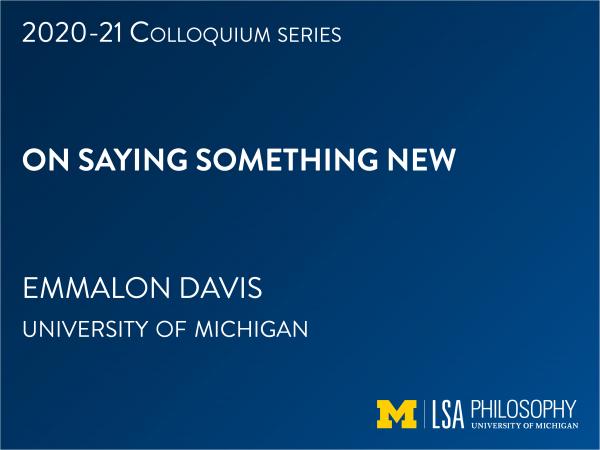
Friday, December 4, 2020
3:00-5:00 PM
Virtual
A passcode is required to attend this virtual event. Contact phil.events@umich.edu to request the passcode.
ABSTRACT
This paper challenges the presumption and expectation that a successful philosophical contribution will be a novel one. Novelty—understood as the value of saying something new—appears to be a good-making feature of a philosophical argument. Beyond this, however, novelty functions as a marker of success: arguments that are understood to contribute something new are considered successful; arguments that do not contribute something new are considered unsuccessful. When novelty serves as a marker and metric of success, the pursuit of novelty becomes an aspirational ideal. In this paper, I argue that an aspirational ideal of novelty is neither desirable nor feasible.
To do so, I distinguish two constituent elements—novelty as ingenuity/originality and novelty as discovery/priority—which, taken together, comprise the aspirational ideal of novelty. I outline a series of traps or pitfalls associated with the practical pursuit of each component part and show that efforts to avoid traps associated with one render an aspirer vulnerable to traps associated with the other. Thus, an aspirational ideal of novelty should be rejected, as the successful pursuit of each component part is in tension with the other. Throughout my analysis, I show that the greatest risks accompanying the pursuit of novelty are unevenly distributed and that an aspirational ideal of novelty disadvantages certain practitioners disproportionately. For all of these reasons, I conclude that the pursuit of novelty is less desirable and less attainable than it appears.
ABSTRACT
This paper challenges the presumption and expectation that a successful philosophical contribution will be a novel one. Novelty—understood as the value of saying something new—appears to be a good-making feature of a philosophical argument. Beyond this, however, novelty functions as a marker of success: arguments that are understood to contribute something new are considered successful; arguments that do not contribute something new are considered unsuccessful. When novelty serves as a marker and metric of success, the pursuit of novelty becomes an aspirational ideal. In this paper, I argue that an aspirational ideal of novelty is neither desirable nor feasible.
To do so, I distinguish two constituent elements—novelty as ingenuity/originality and novelty as discovery/priority—which, taken together, comprise the aspirational ideal of novelty. I outline a series of traps or pitfalls associated with the practical pursuit of each component part and show that efforts to avoid traps associated with one render an aspirer vulnerable to traps associated with the other. Thus, an aspirational ideal of novelty should be rejected, as the successful pursuit of each component part is in tension with the other. Throughout my analysis, I show that the greatest risks accompanying the pursuit of novelty are unevenly distributed and that an aspirational ideal of novelty disadvantages certain practitioners disproportionately. For all of these reasons, I conclude that the pursuit of novelty is less desirable and less attainable than it appears.
| Building: | Off Campus Location |
|---|---|
| Location: | https://umich.zoom.us/j/92982703833 |
| Event Link: | |
| Event Type: | Lecture / Discussion |
| Tags: | Free, Philosophy |
| Source: | Happening @ Michigan from Department of Philosophy |

